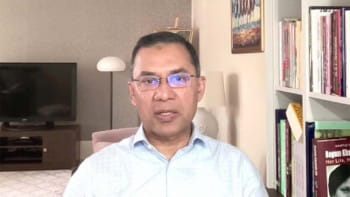Youth keep hockey’s flicker alive

Bangladesh hockey hardly ever makes headlines for the right reasons. A sport in perennial turmoil, the once-promising discipline has been weighed down heavily over decades by powerplay of clubs, financial constraints and a lack of discipline. International success in hockey, hence, is a rare currency.
So when the under-21 team qualified for next year's FIH Hockey Junior World Cup, thereby becoming the first Bangladeshi hockey team to earn the eligibility to compete in any level of World Cup, it came as a pleasing surprise to most. And the achievement now presents a huge opportunity before the hockey federation to cash in on and build a platform for future success.
But there are myriad challenges ahead for the ad-hoc committee of the federation, which has been installed following the change of government in the country in the wake of the July Uprising, to pave the path for success. First and foremost is the financial challenge.
Despite being an Olympic discipline, hockey is not quite a money-generating sport. Unlike football and cricket, the member associations in hockey do not receive any funding from its global body, the FIH, or the regional ones like the Asian Hockey Federation. So the Bangladesh Hockey Federation (BHF) relies mostly on local sponsorship apart from the small amount of annual grant it receives from the government to run its regular activities and continue development projects.
When the 80-day training camp was held at the BKSP ahead of the Under-21 Asia Cup in November-December, the federation was only able to provide the bare necessities to the players in terms of daily allowance and logistical support. Against this backdrop, the fifth-place finish for the young team which featured a draw against Malaysia and a win against China – both much higher-ranked teams – deserves a lot of credit.
The team's captain Mehrab Hasan Samin, speaking to media following the team's return from Oman, hoped their hard work would lure more interest from sponsors and that they could emulate their success in the 24-team Junior World Cup in India later this year.
"We faced a lot of hardship in the camp. The facilities and allowances were minimal. But we did hard work and ignored all of that thinking that if we can do well here and qualify we will be recognised and rewarded," Samin had said.
Preparing this team for the World Cup is just a short-term programme that the federation needs to undertake now. But there are various other avenues that need to be focused upon if a broader range of success is demanded from the sport.
For example, women's hockey, which is still at a nascent stage in the country, needs a bit of attention. There was a rude awakening for the country's hockey officials recently regarding Bangladesh's standing in global women's hockey.

The day the men's junior team returned from Oman, triumphant and full of hope, the women's team set out for the same destination for their maiden Women's Junior Asia Cup appearance. Ambitions were high, goals were moderate, but the outcome was quite frustrating. The team eventually returned empty-handed, losing all their group games, including against Thailand whom they had beaten in the qualifying campaign of this tournament.
The ad-hoc committee's general secretary Lt Col (retd) Riazul Hasan admitted that there is a lot to be done on the women's hockey front.
"There are various issues involved with women's hockey, especially keeping in mind the social context," Riazul told The Daily Star. "The team that we have right now is very young, 16 years old on average. So our job will be to keep these players and groom them for the future. Furthermore, we will ask the district and divisional organisers to see how they can help us in women's hockey."
The most pressing issue, though, is preparing a solid pipeline for the senior team by ensuring that top-tier competitions like the premier league, the club cup and the first division hockey league are kept on the pitch every year.
Ending a long hiatus, the premier league was held earlier this year, but the standard of competition and the ability of the clubs to form teams were called into question various times during the event.
The reason? Most clubs could not get enough financial support to form teams or give the players proper accommodation and other facilities. This is the same reason why the sport has become confined inside the boundaries of the BKSP, all but extinguished from the rich breeding grounds of Old Dhaka, Faridpur, Naogaon, Dinajpur and other district towns.
Whether the officials of the new committee at the hockey federation have the means and the time in hand to address and solve these issues remains to be seen, but the youth team have at least provided them with a window of opportunity to pounce upon.


 For all latest news, follow The Daily Star's Google News channel.
For all latest news, follow The Daily Star's Google News channel. 





Comments